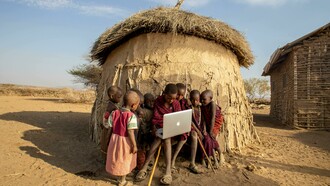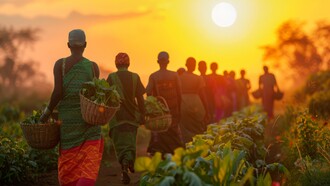The story goes that on his first voyage to what would become America, Christopher Columbus disembarked on October 12, 1492, on a beach he named San Salvador, today Wattlin, in the Bahamas archipelago. By December 1 he chose to live in a wonderful setting on an island he called Hispaniola. He took possession of it without asking, obviously, the locals. Colonization began by building a fort called "La Navidad", on the north coast of what is today Haiti. There he celebrated, on December 24 of that very year, the first Christmas Eve in this continent unknown to Europeans, which would deliver unlimited riches to the crown of Spain and infinite pain to its inhabitants. In the name of his lord king, Columbus initiated from here the occupation, exploitation, disease, extermination and colonization of Latin America.
However, it was also this very island, already divided and partially converted into Haiti, which became the first place to abolish slavery in 1803 and the second independent republic of the continent in 1804, after the United States. It was also the first republic in the world formed by Afro-descendants. Previously, in the 17th century, this rich colony had been offered as a gift by Spain to France. It specialized in the production of sugar and therefore imported thousands of thousands of slaves who were hunted and transported from various parts of Africa, with different cultures, beliefs and languages; mixed and exploited on the island that was by then called Saint-Domingue. The colonialist iron fist allowed for the birth of great fortunes, slave ships and buoyant commerce. Until 1791, the insurrection of slaves who took up arms and fought for 13 years until they defeated the French. Thus was born the first independent country in what is now Latin America. The French Revolution with its ideas of liberty, equality and fraternity had deeply influenced the struggle to abolish slavery. In 1804, the republic was proclaimed and its main hero Jean Jacques Dessalines, a former slave who became a general, after a few months in power started calling himself emperor of the Haitians with the name of Jacques I, in perfect Napoleonic style. He consolidated his power with refined cruelty and thousands of victims until he was assassinated by his close collaborators.
Since then, the country's history has been one of suffering, poverty, hunger and bloodshed. The 20th century began for Haitians with the invasion and occupation of the U.S. Marines who took control of the country, as did investors with the sugar industry, and Citibank with Haiti's Central Bank, responsible for the issuance of the local currency. In 1957, the government in DC imposed François Duvalier, known as Papa Doc, while dictator Leonidas Trujillo ruled in the neighboring Dominican Republic; the Somoza dynasty in Nicaragua, since 1937; and Fulgencio Batista in Cuba since 1952. No one better to safeguard U.S. interests in the region than those faithful guardians. Duvalier was succeeded by his son in 1971, Baby Doc, until 1986, when a popular uprising sent him into exile in France. Trujillo, after ruling uninterruptedly for 30 years, was executed in 1961 by an armed group in Santo Domingo. The last of the Somozas, known as "Tachito", ruled for 12 years until he was overthrown by the Sandinista revolution to be then assassinated in Paraguay by an Argentine revolutionary commando. Batista's dictatorship in Cuba lasted nine years until Fidel Castro's entry into Havana on January 1, 1959, with the dictator escaping to Miami on New Year's Eve.
The state of Haiti today occupies the western part of the island with 27,750 km2 and has an estimated population of over 11 million people, in addition to about two million abroad, mainly in the Dominican Republic, the US, and countries such as Spain and Chile, among others. Subsistence agriculture and remittances are the main resources for the majority of the population. The neighboring Dominican Republic, located in the central and eastern part of the island, is almost twice the size, with 48,442 square kilometers and a population of only 10.5 million inhabitants. While the former is the poorest country in Latin America, with a per capita income, in 2019, of only US $1,273 per year, the latter reached US$ 8,583, with tourism being one of its main revenues. The uncontrolled emigration of Haitians to the neighboring country has led to the fact that, following the example of former President Trump, on the border of the United States with Mexico, the Dominican government has begun, in 2019, the erection of a brick wall four meters high topped with wires, blades and motion sensors in the main places of illegal transit. It is 376 kilometers long and will hardly ever be completed. The official explanation is that it is there to help combat illegal immigration, trafficking of arms, drugs, livestock and stolen vehicles. In view of the general closing of borders to immigration, Haitians today are trying to reach Suriname and from there cross to the French overseas province of French Guiana. In short, the only thing that matters for any Haitian today is to emigrate, no matter to which country.
Currently, Latin America as a region is not present in what is happening in Haiti, where the government of President Jovenel Moïse, who took office in 2017, is severely questioned for his plans of wanting to call a plebiscite to reform the constitution in force since 1987, the longest in its history, and for the dismantling of the precarious institutionality, along with the endemic corruption. His election never had legitimacy, since it was questioned for fraud, and due to the low electoral participation, that did not reach 20%, although this is part of the political reality of the country. The president has dismissed three members of the supreme court, the parliament has not been functioning for a year, and the call for a plebiscite is for the democratic forces a sign of the authoritarianism he wishes to implement, and which would move the country even further away from democracy. Although Haiti's instability is historical, today security is not guaranteed for anyone, and people are locking themselves in their homes. Armed gangs grouped in the so-called G-9 control an important part of the capital, committing robberies and kidnappings on a daily basis, along with drug and arms trafficking. According to United Nations sources, there are more than 200 kidnappings per month: foreigners, priests, children or businessmen. Ransom figures can range from 4,000 to one million dollars. Electricity continues to be a luxury good, accessible only to those who have their own equipment.
The rest of the population has access to electricity only two hours a day. Garbage is not collected, but burned in the streets, and in the event of a fire there is no fire department in any city in the country. The dilemma of many people is whether to die of hunger or of Covid, in a country where there is no sanitary infrastructure, nor reliable statistics to know the real state of the situation. Nor is there a single opinion from the major countries as to whether the president should end his term of office, since for the opposition his term of office ended last February. Moïse maintains that since the vote was repeated, he will only finish next year, a position supported by the United States, while the opposition calls for the appointment of an interim Prime Minister until new elections are held. The United Nations is keeping a low profile except for its humanitarian agencies along with a small political affairs committee mandated by the Secretary General to follow developments. Another group is formed by Brazil, the United States, Canada, Germany, Spain, the European Union and the OAS. The absence of Latin American countries is conspicuous and especially Brazil, under President Jair Bolsonaro, is as if it were not there.
The 2010 earthquake, measuring 7 on the Richter scale, and the successive aftershocks, left more than 200,000 victims and incalculable damage. Most recently, an undetermined number of policemen, at least five, were killed and several others were injured. There is no credibility in the information, and people live in a true "state of nature" in the absence of the State. The news is more like rumors that circulate by word of mouth without being able to verify their veracity. The years of the MINUSTAH or United Nations Stabilization Mission in Haiti, which lasted from 2004 to 2017, provided security to an important part of the population, after the violence unleashed in the main cities until the departure of former President Bertrand Aristide to exile. More than 7,000 troops from 24 countries from all continents participated, including Argentina, Brazil, Chile, Colombia, Ecuador and others, trying to meet the objectives of disarming groups, curbing arms and drug trafficking, promoting stability, strengthening institutions and allowing the development of free and democratic elections. Although there were accusations against some soldiers for abuse of women, this does not alter the invaluable service rendered to that country. The mission also contributed to legitimizing the actions of the United Nations and the Latin American countries that actively participated. At the same time, there was a political structure in the region, mainly formed by regional organizations such as CELAC and UNASUR, which were engaged in the seeking of political consensus.
It is true that 13 years is an excessive time for a United Nations peacekeeping mission, but we do not know how many deaths the presence of military forces in that country prevented. Since the departure of the troops, the situation has deteriorated, and Haiti is now on the brink of a new disaster. Governments, when evaluating a new mission, immediately think of the financial costs and debates begin in the internal politics of Latin American countries, especially about sending or maintaining troops abroad. The question is what the states of the region should do in the face of crises such as those in Haiti, Nicaragua and Venezuela, without regional political bodies, without instances of dialogue between heads of state and without effective cooperation, as is currently the case. Today, only the Organization of American States, OAS, is left, which will surely send a group of ambassadors to evaluate the situation – without the strength, resources or credibility to face the serious crisis. On the other hand, only the United States and the European Union can have real influence since France is no longer relevant and is no longer listened to in the region. Other countries such as Germany have stopped providing direct government-to-government cooperation, which is now channeled through Brussels. Canada continues to be Haiti's "good friend" but, like the other countries, has closed its borders to immigration.
Latin America's problems must be solved by Latin Americans, without waiting for the intervention of the big powers. Hence it is important to have instances of dialogue, where heads of state can discuss, confront positions and seek solutions together. Dispersion and ideological rivalries in the region have contributed to the worsening of problems not only in Haiti. In times of uncertainty and great challenges, cooperation and politicians who can look beyond national borders are needed more than ever. Today it is not only Haiti where people are having a hard time, but also other countries on the continent. Only the reencounter with our Latin Americanist traditions can contribute to stop the deepening of the fracture that currently separates Latin American countries and extend a generous hand to the Haitian people.















